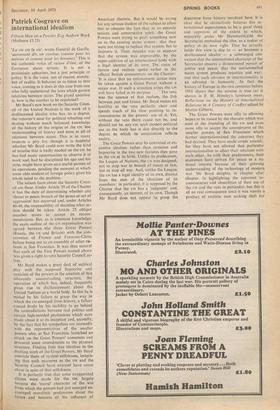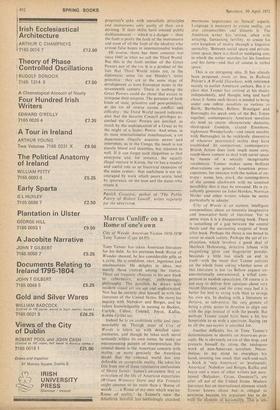Patrick Cosgrave on international idealism
Fifteen Men on a Powder Keg Andrew Boyd (Methuen £3.25) 'La vie est la vie', wrote General de Gaulle, 'autrement dit, un combat, connate pour les nations et comme pour les hommes.' This is the authentic voice of raison d'etat, of the European states system. It is not a pessimistic aphorism, but a just principle of policy. It is the voice, not of reason, merely, but of reality. It behoves us to listen to that voice, coming as it does in this case from one who fully understood the laws which govern relations between states. The grand question is, how is the combat to be regulated?
Mr Boyd's new book on the Security Coun- cil of the United Nations is the work of a disillusioned idealist who has, to a degree, the reporter's nose for political wheeling and dealing without much balanced knowledge of the history of the origins of the UN, less understanding of history and none at all of relations between states. This is in many respects a pity for, though it is doubtful whether Mr Boyd could ever write the kind of treatise that is badly needed on the UN, he has had many opportunities to observe it at work and, had he disciplined his ego and his style, might have given us a useful picture of its operations, pending the moment at which some able student of foreign policy gives his whole mind to the problem.
The salient facts about the Security Coun- cil are these. Under Article 39 of the Charter it has the duty of determining whether any 'threat to peace, breach of the peace or act of aggression' has occurred and, under Articles 40-49, the responsibility of deciding what ac- tion should be taken. Article 25 obliges member states to accept its recom- mendations. But, as is common knowledge. the main outline of the uN organisation was agreed between •the three Great Powers (Russia, the us and Britain) with the con- currence of France and Formosa-China before being put to an assembly of other na- tions at San Francisco. It was thus natural that each of the Five Powers named above was given a right to veto Security Council ac- ticin.
Mr Boyd makes a great deal of satirical Play with the supposed hypocrisy and cynicism of the powers in the creation of this inherently countervailing structure, the operation of which has, indeed, frequently given rise to disillusionment about the United Nations as a world body. In this he is misled by his failure to grasp the way in which the UN emerged from history, a failure caused firstly by his inability to go behind the contradictions between real politics and certain high-minded professions which were made about it at its inception and, secondly, by the fact that his sympathies are avowedly with the representatives of the smaller Powers who, at San Francisco, launched an attack on the Great Powers' consensus and procured some amendments to the planned structure. Finding little true idealism in the drafting work of the Great Powers, Mr Boyd convicts them of cynical selfishness, imagin- ing that such successes as the UN and the Security Council have enjoyed have come about in spite of that selfishness.
It is perfectly true that some exaggerated Claims were made for the UN, largely because the 'moral' character of the war from which the powers had just emerged en. couraged moralistic professions about the future and because of the influence of American rhetoric. But it would be wrong for any serious student of the subject to allow this to obscure the fact that, in an entirely serious and constructive spirit, the Great Powers were trying to graft something new on to the existing states system : that they were not trying to replace that system, but to improve it. Their mistake was to suppose that the system was improvable, by the super-addition of an international body with a legal identity of its own. The voice of reason and realism spoke rather in the official British commentary on the Charter: 'It is clear that no enforcement action may be taken against a Great Power without a major war. If such a situation arises the UN will have failed in its purpose . . . ' The veto was the essence of that realism, the link between past and future. Mr Boyd makes his hostility to the veto perfectly clear and spends much of his time pointing to in- consistencies in the powers' use of it. Yet, without the veto there could not be. and should not be, any UN; such modest political use as the body has is due directly to the degree to which its constitution reflects reality.
The Great Powers may be convicted of ex- cessive idealism rather than cynicism and hypocrisy in the two new features they gave to the UN at its birth. Unlike its predecessor, the League of Nations, the UN was designed, not to stop war in breach of treaty or law, but to stop all war. And, unlike the League, the UN has a legal identity of its own, distinct from the sum of the identities of its members: in particular, it is supposed by the Charter that the UN has a 'judgment' and, consequently, an interest, of its own. Though Mr Boyd does not appear to grasp the departure from history involved here, it is clear that he instinctively believes this in- ternational separateness to be a good thing and approves of the extent to which. especially under Mr Hammarskjold, the Secretariat embodied the idea, as a maker of policy in its own right. That he actually holds this view is due to — as becomes a disillusioned idealist — a submerged con- viction that the international character of the Secretariat ensures a disinterested pursuit of justice and peace; that the untrammelled states system produces injustice and war: and that each advance in internationality is an advance in humanity. In fact the history of Europe in the two centuries before 1914 shows that the reverse is true (as is shown in F. H. Hinsley's luminous essay, Reflections on the History of International Relations in A Century of Conflict edited by Martin Gilbert).
The Great Powers were silly in allowing hopes to be raised by the rhetoric which was used at the founding of the UN and even more silly to accept the amendments of the smaller powers at San Francisco which further internationalised the construct they had devised. They have made ample amends, for they have not allowed that particular internationalism to affect their relations with each other. As with their predecessors. their statesmen have striven for peace as a na- tional interest because of their growing understanding of the technology of modern war. Mr Boyd delights, in chapter after chapter, in highlighting the apparent in- consistencies and absurdities of their use of the UN and the veto in particular, but this is of no real consequence since it was merely a product of realistic men making shift for
propriety's sake with unrealistic principles and instruments only partly of their own devising. If their shifts have created public disillusionment — which is a danger — then the fault is partly the.fault of the instruments and most of all the fault of the idealists who arouse false hopes in internationalist bodies.
Of course, there has been constant war since 1945 in what we call the Third World. But this is the fault neither of the Great Powers nor of the UN. It is a product of the fact that Third World states are, in the diplomatic sense (to use Hinsley's term) primitive: they are at the same stage of development as were European states in the seventeenth century. There is nothing the Great Powers could do about that except to reimpose their empires. The presence of both kinds of state, primitive and post-primitive, at the UN of course causes conflict and difficulty: the Third World record indicates also that the Security Council privileges ac- corded the Great Powers are justified, as much by the sophistication of a Great as by the might of a Super, Power. And when, in its most internationalist manifestation, a UN department illegally acquires power and intervenes, as in the Congo, the result is not merely blood and shambles, but injustice as well. If it can forget such illegalities as that enterprise and, for instance, the equally illegal venture in Korea, the UN has a modest and useful role as an historical extension of the states system: that usefulness is not en- couraged by work which pours scorn, bred by ignorance, on the men and the states who create it.
Patrick Cosgrave, author of The Public Poetry of Robert Lowell', writes regularly
£2.50 for the SPECTATOR











































 Previous page
Previous page